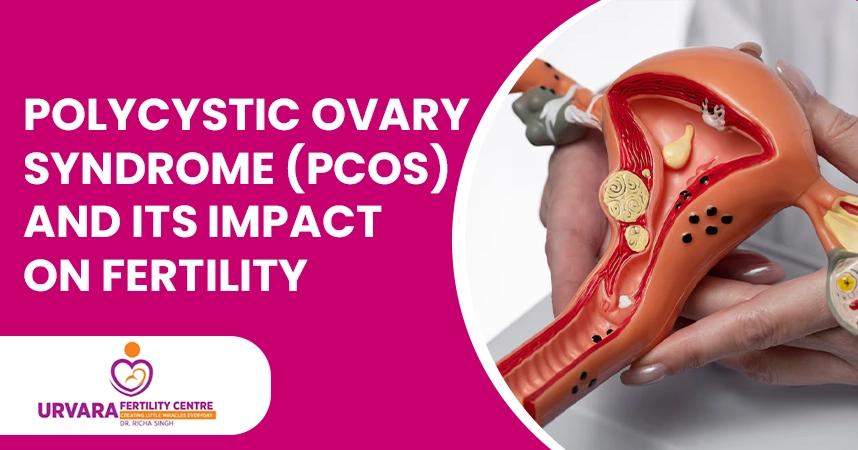
Polycystic Ovary Syndrome (PCOS) and Its Impact on Fertility
Polycystic ovary syndrome (PCOS) is a common but often misunderstood condition that affects millions of women worldwide. Beyond its impact on overall health, PCOS is one of the leading causes of infertility, creating significant emotional and physical challenges for those aspiring to start a family.
Are irregular menstrual periods, unexpected weight gain or difficulty conceiving causing concern? These can all be linked to PCOS, a hormonal disorder that disrupts ovulation and fertility. The good news is that understanding PCOS and its impact on fertility can help you take charge of your health and increase your chances of conceiving.
This blog discusses the connection between PCOS and fertility in-depth, addresses common concerns, provides practical advice, and provides information on the latest treatments available. Whether you’ve been recently diagnosed or are exploring fertility options, this guide provides valuable information designed to help you on your journey to becoming a parent. Let’s find solutions together.
What is PCOS?
Polycystic ovary syndrome (PCOS) is a hormonal condition that affects the functioning of a woman’s ovaries. It has three main characteristics:
- Irregular Menstrual Cycles: This is a sign of irregular or no ovulation.
- Elevated Androgens: High levels of male hormones cause symptoms such as acne, excessive hair growth and thinning of hair.
- Polycystic Ovaries: The enlarged ovaries visible on ultrasound contain multiple small follicles.
How Does PCOS Impact Fertility?
Irregular ovulation is the main hurdle in conceiving for women suffering from PCOS. Below are how it hampers fertility:
- Hormonal Imbalance: Increased levels of androgens inhibit the development and release of mature eggs, a process necessary for fertilization.
- Insulin Resistance: Many women with PCOS have insulin resistance, which leads to increased insulin levels. As a result, androgen production increases, which interferes with ovulation.
- Anovulation: Without the release of an egg during the menstrual cycle, natural conception becomes impossible.
Related:- PCOS and Pregnancy Complications
Common Concerns About PCOS and Fertility
Q1. Can I get pregnant if I have PCOS?
Yes, many women with PCOS conceive successfully with the right treatment and lifestyle adjustments.
Q2. What are my chances of getting pregnant naturally?
While PCOS lowers the chances of natural conception, paying attention to lifestyle factors such as diet, exercise, and weight management can significantly improve your chances.
Q3. How do I know if my infertility is due to PCOS?
Symptoms such as irregular menstrual periods, excessive hair growth or difficulty getting pregnant may be a sign of PCOS. The doctor can confirm it through blood tests and ultrasound.
Steps to Improve Fertility with PCOS
1. Lifestyle Modifications:
- Balanced Diet: Focus on whole grains, low-fat proteins, healthy fats, and foods with a low glycemic index (GI) to keep blood sugar levels stable.
- Regular Exercise: Moderate physical activity such as walking, yoga or swimming can help regulate hormones and aid weight loss.
- Weight Management: Losing as little as 5–10% of body weight can restore ovulation in many women with PCOS.
2. Medical Interventions:
- Ovulation Induction: Medications such as Clomid or Letrozole can stimulate egg release.
- Insulin Sensitizers: Metformin can lower insulin and androgen levels, thereby improving ovulation.
- Supplements: Inositol and vitamin D are often recommended to enhance hormonal balance.
3. Fertility Treatments:
- IUI (Intrauterine Insemination): If ovulation is achieved with medication then this is a straightforward treatment option.
- IVF (In Vitro Fertilization): This is a highly effective solution for people who do not respond to other treatments.
4. Surgical Options:
- Ovarian Drilling: In rare cases, this procedure may lower androgen levels and stimulate ovulation.
Related:- The Connection Between AMH Levels and PCOS
Managing PCOS During Pregnancy
If you have PCOS and become pregnant, you may face unique challenges such as gestational diabetes or high blood pressure. Regular prenatal care and maintaining a healthy lifestyle are important to reduce the risks for both you and your baby.
Addressing Emotional Concerns
Infertility due to PCOS often brings emotional stress. Getting support through counselling or joining PCOS support groups can make a big difference in dealing with the challenges.
Why Early Diagnosis Matters
Early diagnosis and intervention are crucial for managing PCOS and improving reproductive outcomes. If you suspect you may have PCOS, consult a healthcare provider for a personalized plan.
Conclusion
PCOS may seem like a major obstacle to fertility, but with the right approach, many women overcome its challenges and fulfil their dream of becoming parents. Whether through lifestyle changes, medications or advanced fertility treatments, hope and help are available. By understanding your situation and getting expert guidance, you can take the first steps toward a healthier future and fulfilling your family goals.
If you’re concerned about PCOS and its impact on your fertility, contact Urvara Fertility Centre today. With the right care and resources, a brighter tomorrow is within your reach.
Content Created By:

Cyberbizz Technologies
Team - Content Curator

